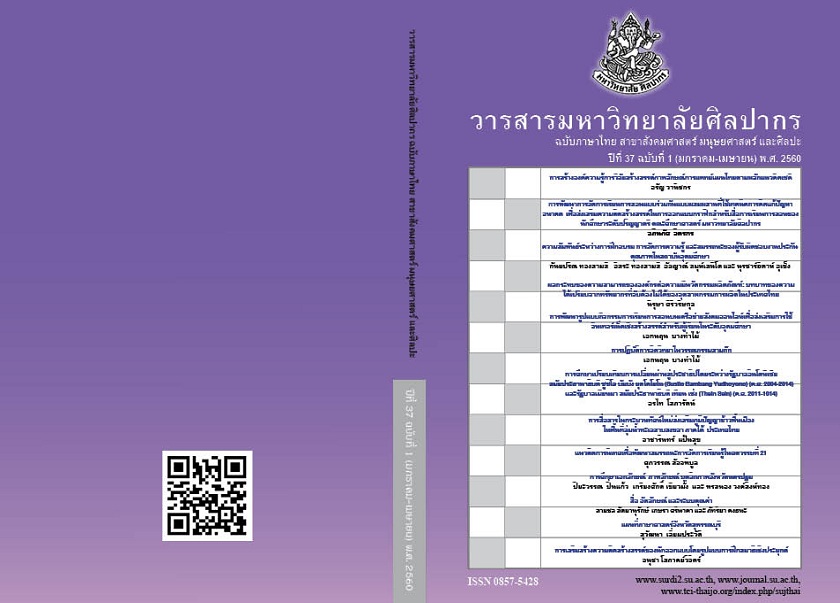แนวคิดการนิเทศเพื่อพัฒนาสมรรถนะการจัดการเรียนรู้ในศตวรรษที่ 21 (Supervision Concepts for the Development of Learning Management Competencies in the 21st Century )
Main Article Content
Abstract
การนิเทศในศตวรรษที่ 21 มุ่งเน้นการนิเทศที่เกิดจากความสมัครใจของครูผู้สอนในการที่จะพัฒนาการจัด การเรียนรู้ของตนตามเป้าหมายที่กำหนด ผ่านการมีส่วนร่วมของบุคลากรที่อยู่ในบริบทการเรียนรู้เดียวกัน และส่งเสริมการสร้างบรรยากาศของการพัฒนาวิชาชีพครูที่มีการเกื้อกูลกันและกันอย่างเป็นมิตร โดยมีผู้สอนงาน (coach) ซึ่งเป็นผู้รู้ที่เข้ามาส่งเสริมความรู้และฝึกฝนทักษะที่สัมพันธ์กับเป้าหมายที่ผู้สอนต้องการพัฒนาก่อนการสอน ทำการสังเกตการสอน และกระตุ้นให้ครูผู้สอนวิเคราะห์และสะท้อนผลการปฏิบัติการสอนของตนเองจนสามารถพัฒนาการจัด การเรียนรู้ของตนได้ตรงตามเป้าหมาย และมีพี่เลี้ยง (mentor) เป็นผู้คอยสนับสนุน ส่งเสริม ให้กำลังใจตลอดกระบวนการจัดการเรียนรู้เพื่อให้ผู้สอนสามารถพัฒนาบทเรียนที่จะช่วยให้ผู้เรียนเกิดการเรียนรู้ได้อย่างมีประสิทธิภาพ นอกจากนี้ การนิเทศในศตวรรษที่ 21 ยังต้องมีการนำเทคโนโลยีต่างๆเข้ามาช่วยสนับสนุนให้การนิเทศเป็นไปอย่างมีประสิทธิภาพและทันต่อความต้องการของผู้รับการนิเทศ โดยเฉพาะระบบเครือข่ายสังคมออนไลน์ทางการศึกษาที่สามารถนำมาประยุกต์ใช้ในขั้นตอนต่างๆของการนิเทศได้อย่างมีประสิทธิภาพ ไม่ว่าจะเป็น การติดต่อสื่อสาร การให้คำปรึกษา การเสนอแนะแหล่งการเรียนรู้ และการนิเทศออนไลน์ ซึ่งช่วยทำให้ผู้นิเทศสามารถติดตามพัฒนาการของผู้สอนได้อย่างสม่ำเสมอและต่อเนื่อง กระบวนการนิเทศดังกล่าวข้างต้นจะช่วยพัฒนาทักษะการสะท้อนคิด การประสานความร่วมมือ และการใช้เทคโนโลยีสารสนเทศของผู้สอน อันจะนำไปสู่การพัฒนาสมรรถนะการจัดการเรียนรู้ในศตวรรษที่ 21 ได้อย่างมีประสิทธิภาพ ดังนั้น การนำแนวคิดกระบวนการสอนงานและการเป็นพี่เลี้ยง (Coaching and Mentoring) การพัฒนาบทเรียนร่วมกัน (Lesson Study) และการเรียนรู้แบบผสมผสาน (Blended Learning) มาประยุกต์ใช้ในกระบวนการนิเทศ จึงช่วยพัฒนาคุณภาพการจัดการเรียนการสอน อันจะส่งผลถึงการพัฒนาคุณภาพของผู้เรียนในศตวรรษที่ 21 ต่อไป
Downloads
Article Details
References
Allen, I. E., Seaman, J., and Garrett, R. (2007). Blending in: The Extent and Promise of Blended Education in the United States. Needham, MA: The Sloan Consortium.
Bellanca, J. and Brandt, R. (Eds). (2011). 21st Century Skills: Rethinking How Students Learn(ทักษะแห่งอนาคตใหม่: การศึกษาเพื่อศตวรรษที่ 21) (V. Vongkijrungruang and A. Jittaruak, Trans.) Bangkok: Openworlds.
Bonk, C. J. and Graham, C. R. (2006). The Handbook of Blended Learning: Global Perspectives, Local Designs. San Francisco, CA: Pfeiffer Publishing.
Carman, J. M. (2005). Blended Learning Design: Five Keys Ingredients. [Online]. Retrieved October 15, 2015 from http://www.agilantlearning.com/pdf/ Blended%20L.pdf.
Carol, A. M. (2012). The SAGE Handbook of Mentoring and Coaching in Education. Thousand Oaks, CA: SAGE.
Driscoll, M. (2002). Blended Learning: Let's Get beyond the Hype. Learning and Training Innovation Newsline. [Online]. Retrieved October 5, 2015 from http://www.tojde.anadolu. edu.tr/tojde 49/articles/article_8.htm.
Fernandez, C. and Yoshida, M. (2004). Lesson Study: A Japanese Approach to Improving Mathematic Teaching and Learning. New Jersey: Lawrence Erlbaum Associate.
Graham, C. R. (2006). The Handbook of Blended Learning: Blended Learning System. San Francisco, CA: Pfeiffer Publishing.
Office of the Basic Education Commission. (2009). UTQ-225 Coaching, Lesson Study Innovation. (UTQ-225 นวัตกรรมการนิเทศ การศึกษาชั้นเรียน). Bangkok: Ministry of Education.
Oliva, P. F. and Pawlas, G. (2008). Supervision for Today’s Schools (8th ed). Hoboken: Wiley Publishing Wiley/Jossey-Bass education.
Inprasitha, M. (2003). raining Document for Teacher Training Course. Khon Kaen: Faculty of Education, Khon Kaen University.
Ibarra, H. (2011). Coaching and Mentoring(การสอนงานปรึกษาและดูแล) (3rd ed.; K. Ruamdaecha, Trans.). Bangkok: Expernet.
Laoriendee, W. (2013). Science of Teaching Supervision and Coaching: Professional Development: Theory, Strategy to Practice (ศาสตร์การนิเทศการสอนและการโค้ช: การพัฒนาวิชาชีพ: ทฤษฎี กลยุทธ์ สู่การปฏิบัติ) (12th ed). Nakhorn Prathom: Faculty of Education, Silapakorn University.
Ngamkanok, S. (2013). Educational administration for Enhancing Lesson Study (การบริหารการศึกษาเพื่อส่งเสริมการศึกษาบทเรียน). Suksasart Journal, 24,3(March – June): 37-47.
Pahae, S. (2012). Blended Learning (การเรียนรู้แบบผสมผสาน). [Online]. Retrieved October 19, 2015 from http://www.addkutec3.com/wpcontent/uploads/2012/08/blended-learning.pdf.
Panleart, C. (2013). Coaching: Essential Strategy for Developing Teacher’s Instruction(การชี้แนะ: ยุทธวิธีสำคัญในการพัฒนาการจัดการเรียนการสอนของครู). [Online]. Retrieved October 11, 2015 from http://www1.nsdv.go.th/innovation/coaching.htm. Partnership for 21st Century Learning (P21). (2015). Framework for 21st Century Learning. [Online]. Retrieved February 10, 2014, from http://www.p21.org/storage/documents/docs/ P21_Framework _Definitions_New_Logo_2015.pdf.
Parsloe, E. and Leedham, M. (2009). Coaching and Mentoring: Practical Conversations to Improve Learning (2nd ed). Philadelphia: Kogan Page.
Phuwittayaphan, A. (2005). How to Teach to Get a Job(สอนงานอย่างไร...ให้ได้งาน). Bangkok: H R Center.
Sangchai, K. (2015). Supervision of Education Change Agent (ศึกษานิเทศก์ ผู้นทำาการเปลี่ยนแปลงด้านการนิเทศ). [Online]. Retrieved September 1, 2015 from http://school.go.th/nites/km/56 km/1st-kriengsak.pdf.
Satchukorn, S. (2004). Coaching Techniques (เทคนิคการสอนงาน). Bangkok: Saitharn.
Srisasaluck, N. (2010). Supervision in Bang Len Schools Group in Nakhon Pathom Educational Service Area Office 2 (การนิเทศในโรงเรียนกลุ่มบางเลน สำนักงานเขตพื้นที่การศึกษานครปฐม เขต 2). Department of Educational Administration, Graduate School, Silapakorn University.
Sriwongkol, T. (2007). The Blended Learning Design Which Integrated English Language to Facilitate Thai Students in Searching Research Database through Weblog (รูปแบบการเรียนการสอนแบบผสมผสานที่บูรณาการภาษาอังกฤษเพื่อการสืบค้นข้อมูลงานวิจัยโดยอาศัย Weblog กรณีศึกษาระดับปริญญาโท). Department of Technological Education, Faculty of Technical Education, King Mongkut’s University of Technology North Bangkok, Bangkok, Thailand
Stalker, H. and Horn, M. B. (2012). Classifying K–12 Blended Learning. Mountain View, CA: Innosight Institute, Inc.
Timnark, S. (2011). Development of Teaching Supervision by Glickman Concept for Develop Learning Management Competency in Thai Teacher’s Reading Skill (การพัฒนารูปแบบการนิเทศการสอนตามแนวคิดของกลิ๊กแมนเพื่อพัฒนาสมรรถภาพการจัดการเรียนรู้ด้านทักษะการอ่านของครูภาษาไทย). Veridian E-Journal Silpakorn University, 4,1(May – August): 491-512.
Trivarayoo, C. (2009). Lesson Study: New Choice for Developing Instruction (การศึกษาผ่านบทเรียน: ทางเลือกใหม่เพื่อพัฒนาการเรียนการสอน). Karusart Journal, 37, 3 (March - June): 131-149.
Trivarayoo, C. (2014). Lesson Study: New Choice for Developing Instruction (การพัฒนาบทเรียนร่วมกัน: ทางเลือกใหม่เพื่อพัฒนาการเรียนการสอน). Workshop Document EDUCA 2014. [Online]. Retrieved October 10, 2015 from http://educa2014.com/wp- content/uploads/2014/11/d16-1.pdf.
Thomas, W. and Smith, A. (2009). Coaching Solutions: Practical Ways to Improve Performance in Education. Mooeabin, Victoria, Australia: Hawker Brownlow Education.
Udombunyanuparp, N. (2009). Charactheristic of New Generation Teacher with Teacher Curriculum Reform in 21st century (คุณลักษณะครูรุ่นใหม่กับการปฏิรูปหลักสูตรผลิตครูในศตวรรษที่ 21). [Online]. Retrieved October 5, 2015 from http://www.ms.src.ku.ac.th/km/file_ethics/20125 2895111.pdf
Vehachat, R. (2012). Educational Supervision(การนิเทศการศึกษา) (5th ed). Mahasarakarm: Thacksin University Book Center.
Woranetsudatip, N. (2011). Lesson Study: New Concept for Teacher Professional Development (การศึกษาชั้นเรียน: แนวคิดใหม่ในการพัฒนาวิชาชีพครู). Khon Kaen Research Journal, 1(2): 86-99.
Wagner, T. (2008). Even Our “Best” Schools Are Failing to Prepare Students for 21st-Century Careers and Citizenship. Educational Leadership, 66, 2 (October): 20-25.
Yoshida, M. (2013). Lesson Study: An Introduction. [Online]. Retrieved July 15, 2015 from: http://www.globaledresources.com.


